
Allan Sherman was an American musician, satirist and television producer who became known as a song parodist in the early 1960s. His first album, My Son, the Folk Singer (1962), became the fastest-selling record album up to that time. His biggest hit was "Hello Muddah, Hello Fadduh", a comic song in which a boy describes his summer camp experiences to the tune of Ponchielli's Dance of the Hours.

In popular music, a cover version, cover song, remake, revival, or simply cover is a new performance or recording by a musician other than the original performer or composer of the song. Originally, it referred to a version of a song released around the same time as the original in order to compete with it. Now, it refers to any subsequent version performed after the original.

Columbia Records is an American record label owned by Sony Music Entertainment, a subsidiary of Sony Corporation of America, the American division of Japanese conglomerate Sony. It was founded on January 22, 1889, evolving from the American Graphophone Company, the successor to the Volta Graphophone Company. Columbia is the oldest surviving brand name in the recorded sound business, and the second major company to produce records. From 1961 to 1991, its recordings were released outside North America under the name CBS Records to avoid confusion with EMI's Columbia Graphophone Company. Columbia is one of Sony Music's four flagship record labels: Epic Records, and former longtime rivals, RCA Records and Arista Records as the latter two were originally owned by BMG before its 2008 relaunch after Sony's acquisition alongside other BMG labels.
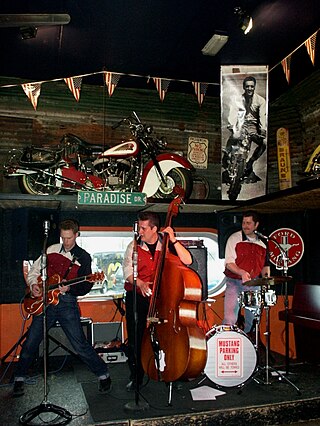
Rockabilly is one of the earliest styles of rock and roll music. It dates back to the early 1950s in the United States, especially the South. As a genre it blends the sound of Western musical styles such as country with that of rhythm and blues, leading to what is considered "classic" rock and roll. Some have also described it as a blend of bluegrass with rock and roll. The term "rockabilly" itself is a portmanteau of "rock" and "hillbilly", the latter a reference to the country music that contributed strongly to the style. Other important influences on rockabilly include western swing, boogie-woogie, jump blues, and electric blues.
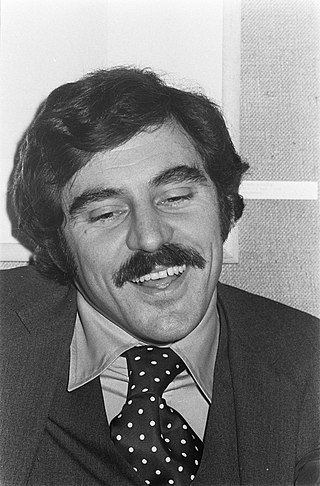
Anthony Newley was an English actor, singer, songwriter, and filmmaker. A "latter-day British Al Jolson", he achieved widespread success in song, and on stage and screen. "One of Broadway's greatest leading men", from 1959 to 1962 he scored a dozen entries on the UK Top 40 chart, including two number one hits. Newley won the 1963 Grammy Award for Song of the Year for "What Kind of Fool Am I?", sung by Sammy Davis Jr., and wrote "Feeling Good", which became a signature hit for Nina Simone. His songs have been sung by a wide variety of singers including Fiona Apple, Tony Bennett, Barbra Streisand, Michael Bublé and Mariah Carey.

Margaret Eleanor Whiting was an American popular music and country music singer who gained popularity in the 1940s and 1950s.

Lynn René Anderson was an American country singer and television personality. Her crossover signature recording, "Rose Garden," was a number one hit internationally. She also charted five number one and 18 top-ten singles on the Billboard country songs chart. Anderson is regarded as one of country music's most significant performers.
Now That's What I Call Music! is a series of various artists compilation albums released in the United Kingdom and Ireland by Sony Music and Universal Music which began in 1983. Spinoff series began for other countries the following year, starting with South Africa, and many other countries worldwide soon followed, expanding into Asia in 1995, then the United States in 1998.
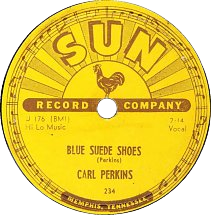
"Blue Suede Shoes" is a rock and roll standard written and first recorded by American singer, songwriter and guitarist Carl Perkins in 1955. It is considered one of the first rockabilly records, incorporating elements of blues, country and pop music of the time. Perkins' original version of the song appeared on the Cashbox Best Selling Singles list for 16 weeks and spent two weeks at the number two position.
Jules Mark Shear is an American singer, songwriter, and guitarist. He wrote the Cyndi Lauper hit single "All Through the Night", the Bangles' hit "If She Knew What She Wants", and the Ignatius Jones and Allison Moyet hit "Whispering Your Name" and charted a hit as a performer with "Steady" in 1985.

"Istanbul (Not Constantinople)" is a 1953 novelty song, with lyrics by Jimmy Kennedy and music by Nat Simon. It was written on the 500th anniversary of the fall of Constantinople to the Ottomans. The lyrics humorously refer to the official renaming of the city of Constantinople to Istanbul. The song's original release, performed by The Four Lads, was certified as a gold record. Numerous cover versions have been recorded over the years, most famously a 1990 version by They Might Be Giants.

Robert Joseph Bare Sr. is an American country singer and songwriter, best known for the songs "Marie Laveau", "Detroit City" and "500 Miles Away from Home". He is the father of Bobby Bare Jr., also a musician.

Earl Stephen Bishop is an American singer-songwriter, actor and guitarist. His biggest hits include "On and On", "It Might Be You" and "Save It for a Rainy Day". He has appeared in and contributed musically to many motion pictures, including National Lampoon's Animal House.
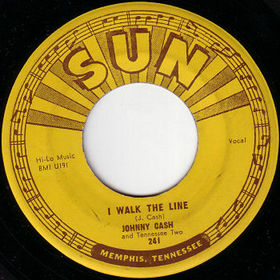
"I Walk the Line" is a song written and recorded in 1956 by Johnny Cash. After three attempts with moderate chart ratings, it became Cash's first #1 hit on the Billboard charts, eventually reaching #17 on the US pop charts.
Billy Norris Sherrill was an American record producer, songwriter, and arranger associated with country artists, notably Tammy Wynette and George Jones. Sherrill and business partner Glenn Sutton are regarded as the defining influences of the countrypolitan sound, a smooth amalgamation of pop and country music that was popular during the late 1960s and throughout the 1970s. Sherrill also co-wrote many hit songs, including "Stand by Your Man" and "The Most Beautiful Girl".
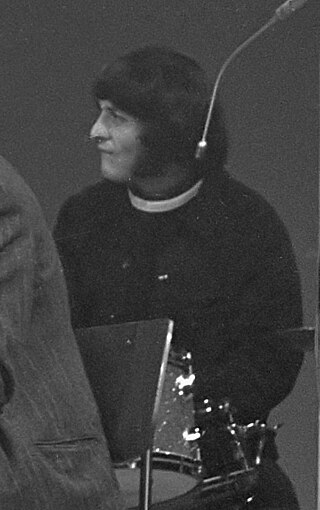
Terence William Harvey 'Terry' Cox played drums in the British folk rock bands The Pentangle, Duffy's Nucleus and Humblebums.
Joe Stampley is an American country music singer. He had success as the lead singer of a rock group, in a country duo with Moe Bandy and as a solo performer. Stampley has released over 20 albums and more than 60 singles in a career that spans seven decades. In 2000, he formed Critter Records.
Toyah was an English new wave band fronted by namesake Toyah Willcox between 1977 and 1983. The only other consistent band member throughout this period was Joel Bogen, Willcox's principal co-writer and guitarist.

Pete Zorn was an American multi-instrumentalist who was a longstanding member of Richard Thompson's backing band. He was also a member of Steeleye Span, The Albion Band, and Driver 67.
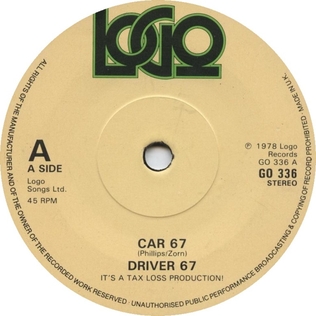
"Car 67" is a novelty song by 'Driver 67' released in November 1978. It was in the UK Singles Chart for twelve weeks, reaching a high of No. 7 in February 1979. The song is a ballad revolving around a cab driver who had split up with his girlfriend the previous day and how he is refusing to make a particular pick-up at 83 Royal Gardens. The song is arranged as the taxi driver singing the lyrics, interspersed with the voice of the taxi controller; the latter of whom has a distinctive West Midlands accent.














